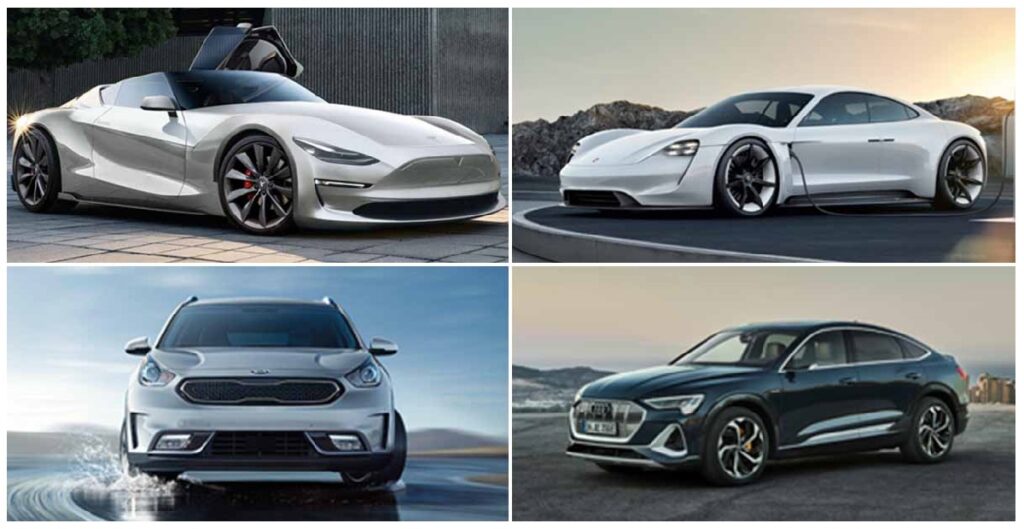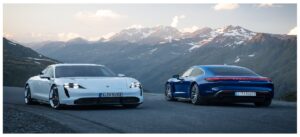
Electric car technology has made great strides over the past few years, moving from a fringe luxury product to a new standard in automotive manufacturing. Electric cars are the future, and every year we see traditional automakers add more electric vehicles (EVs) to their lineup. Everyone is working on Electric Vehicles, from well-established extant manufacturers to new names such as Byton, Lordstown, and Rivian.
Those in the electric automobile industry specialize in electric cars, sports cars, cargo trucks, vans, bikes, and commercial vehicles, as well as electric car parts and services. This article focuses on companies that are primarily considered pure-play electric vehicle manufacturers. The electric car industry is young and fast-growing. Tesla Inc. (TSLA) is one of the more well-known names, but there are others like Workhorse Group Inc. (WKHS) and Archimoto Inc. (FUV) that are developing rapidly.
From the days of horse and car driving to today’s bullet trains and airplanes, people have always come up with creative ways to get from point A to point B. Unfortunately, the transportation industry was often notoriously inefficient in terms of energy consumption. With threats like global warming, it may be easy to give up hope that we will be able to do the right thing. Fortunately, there is a silver lining – technology companies of all backgrounds are working to make even the least eco-friendly industry more sustainable, and the transportation sector is no exception.
Success in the past and uncertainty in the future
EV is the future of mobility and transportation; it is a big step towards road safety and tackling the climate crisis. But the time to transform the industry into an electric future is coming to an end before the technology giants take over. Although there are genuine challenges in financing, for example:
• There are currently no lucrative business cases financially. Tesla is still selling cars below the price point.
• The level of initial investment required to sell EVs on a Great scale.
• The industry lacks artificial intelligence (AI), machine learning, and skills in data analysis – all of which will be critical to the success of the EV market.
• Moving to EV is part of a larger instance shift from analog to digital, Which means changing the whole business model.
The insightful winners for data-driven electric-vehicle financing will be:
• Updated business model.
• Find out the maximum value from the customer relationship and the vehicle.
• Focus on the client to run the advocacy.
• Take the risk to count to win.
Leading the electric car industry
Which electric vehicle company produces the best cars? Many car manufacturers have begun to Introduce electric vehicles, all of which offer a unique car experience with petrol-free driving packages. Most car companies currently only make one EV model because Electric Vehicles are still relatively new to the road.
Tesla: The industry leader
Tesla, Elon Musk’s innovative technology company, is known for producing high-quality, cutting-edge vehicles with high-end and creative features. Tesla’s two most popular vehicles are the Tesla Model S and Tesla Model X, and increasingly, the lower-cost Tesla Model 3.
BMW
BMW is a German car company that produces luxury cars. Recently, they have entered the electric car market with the BMW i3, an all-electric luxury SUV with a compact 5-seater designed primarily for urban and suburban traveling.
Nissan
Headquartered in Japan, Nissan has sold the most EVs of any manufacturer worldwide. Nissan Leaf is their most popular electric car. As the world’s most popular electric vehicle, the Leaf combines all the benefits of driving electric with a relatively low price point.
Chevrolet
Chevrolet is the automotive section of American company General Motors and sells a wide range of vehicles worldwide. Chevy’s first foray into the all-electric car market is the Chevrolet Bolt, which offers over 220 miles per charge at a price far below other long-range vehicles, such as Tesla’s current lineup.
Ford
Ford is a classic American carmaker, producing a Deluge of vehicles for sale worldwide from pickup trucks to plug-in hybrids. Their leading electric vehicle is the Ford Focus Electric. An electric version of the popular Ford Focus, the Focus Electric is an affordable EV with all the look and feel of a standard vehicle, but with over 100 miles per charge in its battery.
Kia
Kia is a South Korean car company that has emerged as an affordable and dependable company to rival brands like Toyota and Honda. Their best-selling electric car is the Kia Soul EV. Soul EV and Focus Electric are similar in design and feel, but the Soul EV has a 100-mile electric power train underneath.

Evaluating the U.S position in the global electric vehicle transition
In terms of electric vehicle production, the United States comes in third behind China and Europe. From 2017 to 2020, the U.S share of cumulative global electric vehicle production since 2010 decreased from 20% to 18%, while manufacturing increased in the other two regions.
The production dynamics of electric cars are determined by where electric vehicle market growth has been considerable and where policies are helping to encourage the transition to electric vehicles. About 15% of the approximately $340 billion in global automaker electric vehicle investments appear to be designed for the United States. Based on the company announcements through 2020, about 5% of this global total is actively being invested in specific U.S assembly plants to increase electric vehicle production. In addition, of the annual electric vehicle sales announced by the automakers by 2025, about 2.3 million vehicles (or about 10%) will be manufactured in the United States.
Breaking down Which Companies Sell Electric Cars
Electricity is coming! Nowadays, hardly a month passes without news of two or three new electric cars or crossovers on their way to the U.S from all types of automakers, big and small. Everyone is hoping to get a part of the Tesla action, though betting that car buyers are getting ready to move from combustion and hybrid-powered vehicles to full EVs. Maybe you are thinking of making such a switch yourself.
Additionally, many of these same automakers have set calendar dates for completely shutting down internal combustion engines. We’ve already told you about all the EVs you can buy in 2021, as well as the electric SUVs available, and now it’s time to shut down all the electric car companies that make them. Who is creating what, right now and shortly? Read on for a list of each company and brand that is organized in alphabetical order and is already preparing or planning for the US market, including a list of their current and future electric cars, trucks, and SUVs.
Every electric vehicle expected to hit the road in the next few years
Electric cars are the future, and each year we’ve seen automakers add more EVs to their lineup. The race to become the leader of the electric vehicle (EV) market is here. There will be at least 125 million electric vehicles on the road by 2030, and millions of dollars will have to be dead on building the charging infrastructure that will allow all those vehicles to run. More and more electric vehicle manufacturers are concentrating on the development of battery management systems and vehicle control units.
In Formula E, the world’s first fully electric, international racing championship, data is helping drivers win races. Actionable insights from data, which the car and its driver on the track share with the engineers and strategists in the control room, provide drivers with a critical advantage in races that are often decided by milliseconds.
Electric vehicles did not materialize as expected:
Audi A6 e-Tron (Expected: 2022)
BMW iX (Expected: 2022)
Bollinger B1 (Expected: 2022)
Cadillac Celestiq (Expected: Sometime before 2025)
Chevrolet Silverado Electric (Expected: 2023)
Ford Explorer EV (Expected: 2023)
Ford F-150 Lightning (Expected: 2022)
Dodge eMuscle (Expected: 2024)
Honda Prologue (Expected: 2024)
Kia EV6 (Expected: 2022)





